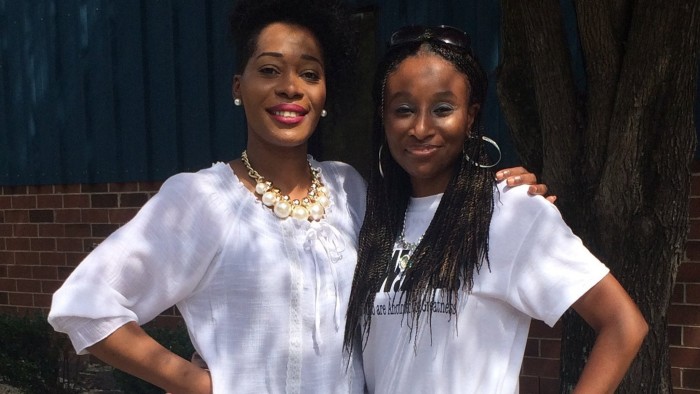Clinton struggles to energise black voters

Roula Khalaf, Editor of the FT, selects her favourite stories in this weekly newsletter.
Dressed in brilliant white, worshippers flowed into the church like a river of cotton and linen. They swayed to a gospel choir, celebrated a congregant’s pay rise, saluted the Holy Rams school football team, and were warned against immorality by their preacher.
The gathering of African Americans at the Word of God church in Raleigh, North Carolina, affirmed the centrality of the church in many black lives. The same worshippers — swing state residents and from a bloc that is traditionally loyal to Democrats — are also central to Hillary Clinton’s hopes.
Black voters turned out in record numbers to give Barack Obama two terms in the White House. The US’s first black president, however, is a hard act to follow. This year excitement over Mrs Clinton is in short supply. “I still have some reservations about her — and that’s the first time ever for me with the Democrat,” says Tia Coffield, a 34-year-old nurse who offset her white outfit for Sunday church with gold stilettos.
“It’s not like 2008, when it was about what the people wanted. Mainly what the candidates are doing is going back and forth finding ways to tear their opponent down. But what are you going to do for us once Obama leaves office?”
North Carolina is in the spotlight after the fatal police shooting of a black man in Charlotte on Tuesday, which ignited riots in which another man was shot and subsequently died. The week had begun with three black mothers whose sons died in police altercations urging people to vote for Mrs Clinton on a visit to the state.
But the lack of enthusiasm for the Democrat is a pervasive problem. She will win with black voters — and by a big margin. The question is how many of them she can inspire to turn out. “It seems highly unlikely that secretary Clinton can do as well as President Obama,” says Peter Brown, a pollster at Quinnipiac University.
If black turnout drops back from the 67-69 per cent powered by Mr Obama to the 61 per cent level of 2004, it will make it harder to hold off Donald Trump in swing states with big black populations, chiefly North Carolina, Virginia, Florida, Ohio and Pennsylvania.
Mr Obama won North Carolina in 2008 then lost it in 2012 as white independent voters swung away from him to Mitt Romney.

Lukewarm feelings towards Mrs Clinton stem from her perceived lack of honesty, says David Paleologos of Suffolk University, whose polling in North Carolina this month found that 22 per cent of likely black voters in the state do not think she is trustworthy.
Even if people vote for Mrs Clinton, their lack of conviction has a knock-on effect because they are less likely to rally others. “Last time I encouraged other people to vote, made sure they had rides, made donations,” says Ms Coffield. “I’m not as involved as I was.”

In the past month Mr Trump has launched an erratic effort to reach out to African Americans, but his support still languishes in mid-single digits and critics say his real goal is to sanitise himself in the eyes of uneasy whites.
Mrs Clinton’s hopes rest partly on using the billionaire’s perceived bigotry to frighten African Americans into voting against him. But despite her campaign hammering him as a racist, congregants at the Word of God church were reluctant to apply that label. Some said they did not want to judge him because they did not know him. Wendy Hinton, 42, said: “I think Trump is a very educated man. I don’t think he’s a racist man. I just think he’s direct.”

This week Mr Trump called the Charlotte shooting and another in Oklahoma “tragic”. He also told a mostly white crowd in North Carolina that “our African-American communities are absolutely in the worst shape that they’ve ever been in before. Ever, ever, ever”. Noting that he had overlooked slavery and segregation, the Clinton camp called it an insult.
The black struggle is in the bones of Princeville, North Carolina, which in 1885 became the first town in the US to be officially incorporated by freed slaves. Ninety-six per cent African American today, it is a verdant and economically depressed rural community where there is no sign of election fever.

Milton Bullock, 76, a singer, actor and town commissioner, says he likes Mrs Clinton, but mainly on the strength of her husband. “I’m assuming that if she gets in trouble with the economy and trying to make some things happen, she can just turn in the bed and say ‘Bill, what do you think about it?’."
Outside a shack-like convenience store, Tan Heath says she is not really following the election, but hears snippets about it from her colleagues at Walmart in an adjacent town. “If I vote, it will be for Hillary. But I won’t vote if I be working,” the twenty-something said.

Mrs Clinton’s other big hope for boosting turnout is Mr Obama. The president told black lawmakers in a weekend speech: “I will consider it a personal insult, an insult to my legacy, if this community lets down its guard and fails to activate itself in this election.”
Mr Obama is still viewed with great affection by many African Americans, though some say he could have done more.
“His good outweighs his bad,” says Ms Coffield. Standing beneath the church cross, she says she will take Mr Obama’s advice on who to vote for. “Somehow or another I know he’s still gonna be in the background,” she says. “If he wasn’t gonna back her, I don’t know if I would vote. I don’t know who I’d vote for.”
Comments